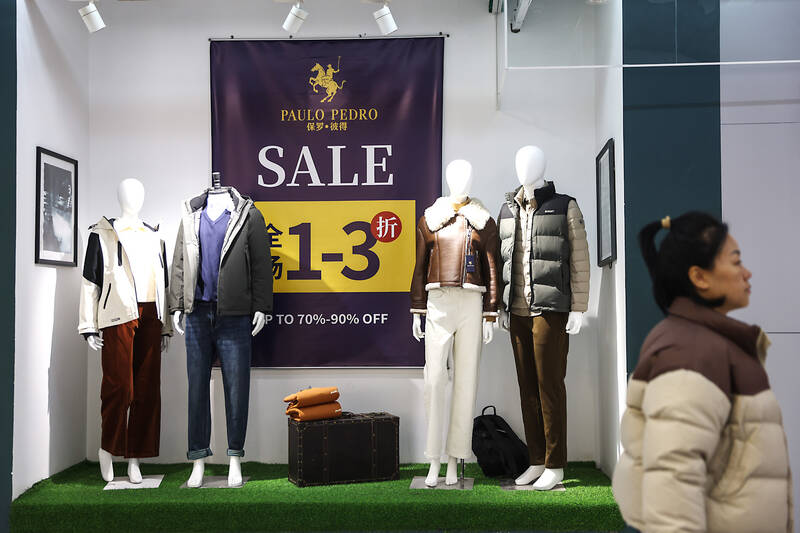China’s retail sales growth weakened last month, official data showed yesterday, missing forecasts as demand remains muted in the world’s No. 2 economy.
The country is battling sluggish domestic consumption, a persistent crisis in the property sector and soaring government debt — all of which threaten Beijing’s official growth target for this year.
Retail sales expanded 3 percent year-on-year last month, the Chinese National Bureau of Statistics (NBS) said, slowing from a 4.8 percent rise in October that was its best reading in eight months.

Photo: EPA-EFE
The figure fell significantly short of the 5 percent forecast in a Bloomberg survey of analysts.
Nomura Holdings Inc chief China economist Ting Lu (陸挺) said the figures showed that “domestic demand was weaker than expected.”
Economic activity was “a bit disappointing” overall, he said, adding that Beijing might need to take even bolder action as the country was “not in a typical downcycle.”
The NBS also said the national urban unemployment rate remained unchanged at 5 percent last month.
Industrial production growth stayed broadly flat at 5.4 percent compared with 5.3 percent in October.
Beijing is pushing for an official national growth target this year of about 5 percent, a goal officials have expressed confidence in achieving, but which many economists believe it would narrowly miss.
The IMF said it expects China’s economy to grow by 4.8 percent this year and 4.5 percent next year.
An NBS spokesperson said that the international environment would likely become “more complex, harsh and uncertain” next year, adding that “trade protectionism will drag down global trade and the recovery of the world economy.”

SEMICONDUCTORS: The German laser and plasma generator company will expand its local services as its specialized offerings support Taiwan’s semiconductor industries Trumpf SE + Co KG, a global leader in supplying laser technology and plasma generators used in chip production, is expanding its investments in Taiwan in an effort to deeply integrate into the global semiconductor supply chain in the pursuit of growth. The company, headquartered in Ditzingen, Germany, has invested significantly in a newly inaugurated regional technical center for plasma generators in Taoyuan, its latest expansion in Taiwan after being engaged in various industries for more than 25 years. The center, the first of its kind Trumpf built outside Germany, aims to serve customers from Taiwan, Japan, Southeast Asia and South Korea,

Gasoline and diesel prices at domestic fuel stations are to fall NT$0.2 per liter this week, down for a second consecutive week, CPC Corp, Taiwan (台灣中油) and Formosa Petrochemical Corp (台塑石化) announced yesterday. Effective today, gasoline prices at CPC and Formosa stations are to drop to NT$26.4, NT$27.9 and NT$29.9 per liter for 92, 95 and 98-octane unleaded gasoline respectively, the companies said in separate statements. The price of premium diesel is to fall to NT$24.8 per liter at CPC stations and NT$24.6 at Formosa pumps, they said. The price adjustments came even as international crude oil prices rose last week, as traders

POWERING UP: PSUs for AI servers made up about 50% of Delta’s total server PSU revenue during the first three quarters of last year, the company said Power supply and electronic components maker Delta Electronics Inc (台達電) reported record-high revenue of NT$161.61 billion (US$5.11 billion) for last quarter and said it remains positive about this quarter. Last quarter’s figure was up 7.6 percent from the previous quarter and 41.51 percent higher than a year earlier, and largely in line with Yuanta Securities Investment Consulting Co’s (元大投顧) forecast of NT$160 billion. Delta’s annual revenue last year rose 31.76 percent year-on-year to NT$554.89 billion, also a record high for the company. Its strong performance reflected continued demand for high-performance power solutions and advanced liquid-cooling products used in artificial intelligence (AI) data centers,

SIZE MATTERS: TSMC started phasing out 8-inch wafer production last year, while Samsung is more aggressively retiring 8-inch capacity, TrendForce said Chipmakers are expected to raise prices of 8-inch wafers by up to 20 percent this year on concern over supply constraints as major contract chipmakers Taiwan Semiconductor Manufacturing Co (TSMC, 台積電) and Samsung Electronics Co gradually retire less advanced wafer capacity, TrendForce Corp (集邦科技) said yesterday. It is the first significant across-the-board price hike since a global semiconductor correction in 2023, the Taipei-based market researcher said in a report. Global 8-inch wafer capacity slid 0.3 percent year-on-year last year, although 8-inch wafer prices still hovered at relatively stable levels throughout the year, TrendForce said. The downward trend is expected to continue this year,